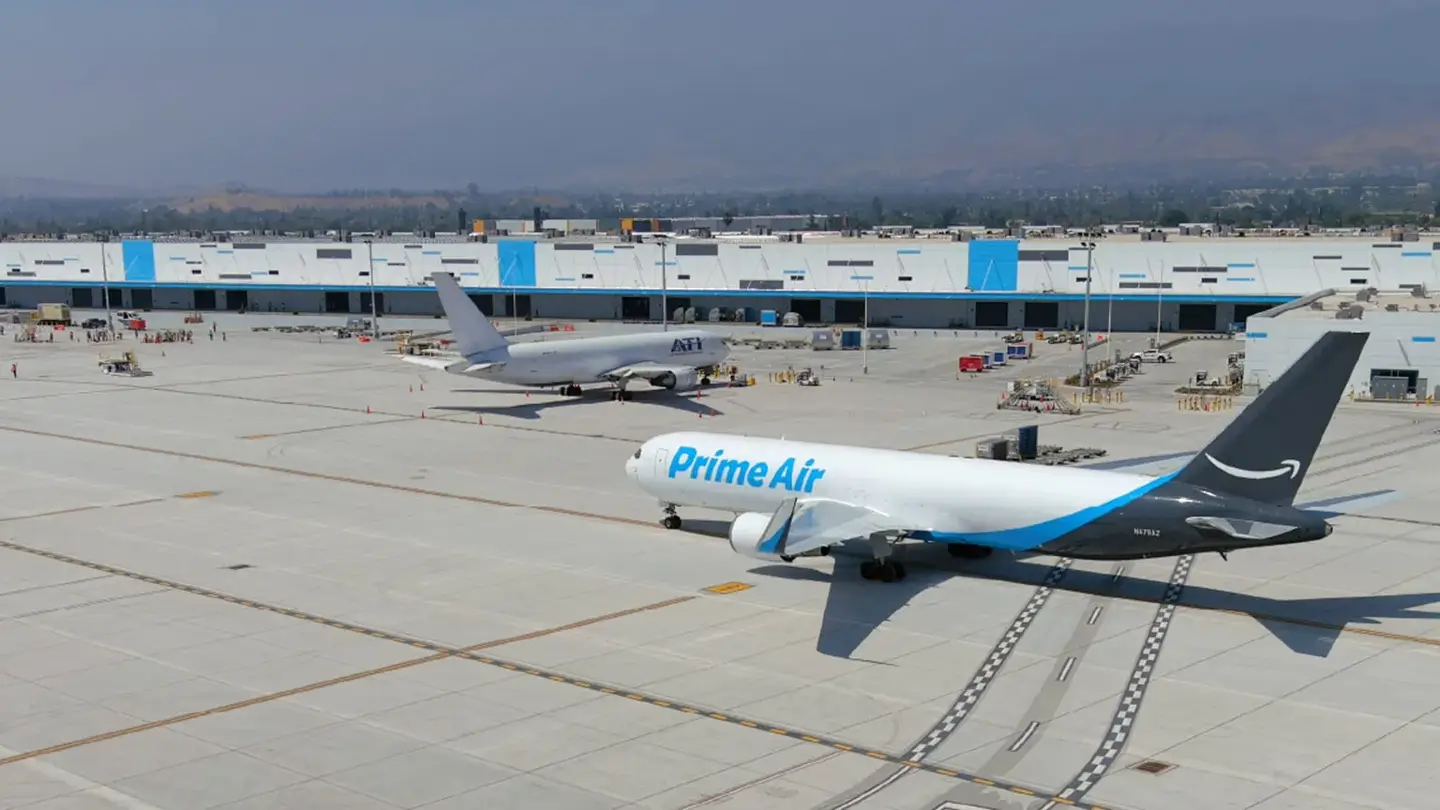California Challenges San Bernardino Air Cargo Facility Used by Amazon
Attorney General Rob Bonta said the original decision conflicts with existing environmental law and puts the local community at risk from harmful diesel truck and jet emissions.

Amazon is running a large air cargo and warehousing operation at San Bernardino airport. [Courtesy: San Bernardino International Airport]
Editor's Note: This article originally appeared on FreightWaves.com.
The state of California on Monday petitioned a federal appeals court to rehear its lawsuit challenging a new air cargo facility at San Bernardino International Airport (KSBD) that is home to a major package hub in Amazon’s air network.
Attorney General Rob Bonta said the original decision conflicts with existing environmental law and puts the local community at risk from harmful diesel truck and jet emissions.
The FAA approved the $200 million Eastgate Air Cargo Logistics Center in 2019, over the objection of California and community groups, and in the summer of 2020, a divided panel for the U.S. Court of Appeals for the 9th Circuit allowed the project to move forward. The attorney general’s office argues the FAA conducted a cursory environmental analysis and understated air pollution impacts from increased truck traffic.
The cargo center includes a 658,500-square-foot warehouse plus ground support buildings and parking spots for 14 all-cargo aircraft.
“It doesn’t matter who you are or how much money you have. You can’t cut corners when the health and well-being of our communities is at stake.”
Rob Bonta, California Attorney General
Amazon (NASDAQ: AMZN) began operating the aircraft ramp and sortation center last April. Online shipments arriving by truck and air are grouped and redistributed by outbound aircraft. State officials say dozens of additional flights and hundreds of truck trips will be generated every day by the middle of the decade, along with at least 1 ton of toxic air pollutants. Amazon currently operates about nine flights per day, according to the airport.
San Bernardino, located about 60 miles east of the Interstate 5 corridor in Los Angeles, is in the heart of the sprawling warehouse region known as the Inland Empire.
Public health advocates and the state say particulate matter and harmful gases in industrial areas disproportionately impact low-income communities and communities of color.
How We Got Here
The original lawsuit filed by former Attorney General Xavier Becerra—now secretary of Health and Human Services in the Biden administration—sought to halt construction of the privately financed air cargo terminal until the FAA completed a comprehensive environmental impact statement that fully accounts for the harm to local communities.
“It doesn’t matter who you are or how much money you have. You can’t cut corners when the health and well-being of our communities is at stake,” said Attorney General Bonta in a news release.
“As the people’s attorney, I’m committed to lifting up the voices of communities who live at the intersection of poverty and pollution. The fact is: communities like the one impacted by this project in San Bernardino are all too often overburdened and under-resourced. These communities, who are already experiencing health harms from pollution, deserve to be protected to the fullest extent of the law, and through our Bureau of Environmental Justice, we’re committed to seeing this fight through.”
According to the California Air Resources Board, residents of San Bernardino are among the top 5 percent of Californians for the prevalence of asthma-related hospital visits, and among the top 3 percent for emergency room visits resulting from heart attacks.
Petitions from the attorney general and advocacy group Earth Justice argue the court’s decision should be reconsidered for several reasons. It said the creation of a new burden of proof for petitioners to challenge FAA decisions under the National Environmental Policy Act (NEPA) is inconsistent with 9th Circuit precedent, which holds that the burden of identifying and analyzing environmental impacts rests with the agency.
The panel also allowed the FAA to base the project’s approval on a flawed environmental analysis of uncertain impacts in contravention of 9th Circuit and Supreme Court precedents. The petition finally asserts that the case is of exceptional importance because of the number of people affected and worth the court’s time, especially since the FAA’s lack of data transparency prevented the state and the public from documenting harmful impacts from the Eastgate project.
The panel that decided the case “erroneously allowed the FAA to rest its approval of the project on the incomplete and inaccurate analysis in the environmental assessment,” the California Department of Justice said in the petition.
If the court agrees to rehear the case, 11 judges will be selected to participate. The initial panel had three judges.

Subscribe to Our Newsletter
Get the latest FLYING stories delivered directly to your inbox






